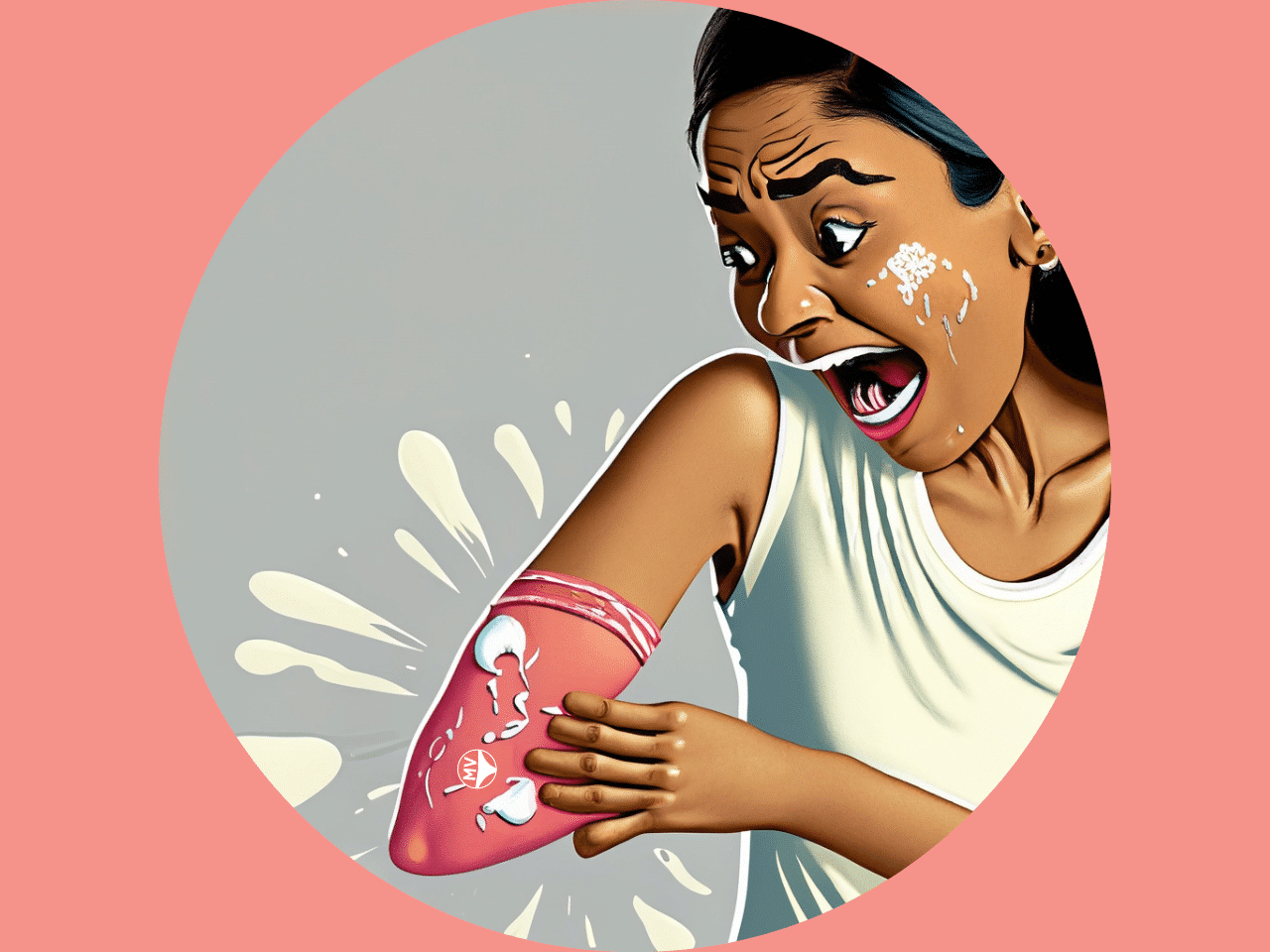Semen allergy is becoming better recognised and acknowledged as more common than previously thought. The medical name for semen allergy is human seminal plasma (HSP) hypersensitivity.
What is a semen allergy?
A semen allergy is actually thought to be primarily an allergy to a specific component of semen, prostate-specific antigen (PSA). Other proteins are also suspected to be involved, but this is the major one. It can happen anytime, not just the first time you have sex, sometimes developing later in life.
About half of the cases appear after first-time sex. It is not an allergy to sperm but to the fluid that sperm travels in, the seminal fluid. The immune system is designed to attack foreign invaders, which semen could be construed as.
It was previously believed that the human body couldn’t become allergic to another human or itself; however, that has long proved untrue.
Symptoms of and risk factors for semen allergy
There seem to be two distinct types of reactions. One is throughout the entire body, and one is localised and restricted to the vagina. It is possible to have both.
Those with just the vaginal reaction are known to have fewer antibodies than those women with a systemic allergic reaction.
Vaginal semen allergy reaction
- Chronic vaginitis
- Vaginal irritation, swelling, burning, itching
- Severe pain, blisters, welts, soreness and redness
Entire body (systemic) reaction
- Itching, swelling, and burning over entire body
- Difficulty breathing, shortness of breath, faintness, dizziness, wheezing, chest tightness,
- Hives, urticaria
- Anaphylaxis (in severe reactions) results in unconsciousness and the theoretical possibility of death (however, there are no recorded deaths by semen as yet)
How semen allergy develops
- Symptoms can appear minutes after sex, or occur hours later in a slower reaction
- The allergy can develop over months or years, then appear seemingly out of nowhere
- Women who have this allergy are likely to have other allergies like hayfever, asthma and food allergies
- It is more likely to happen after childbirth or other vaginal surgeries or trauma
- Once you have had your first allergy attack, the tendency is for them to continue and become worse, rather than better and fewer
Diagnosis of semen allergy
Diagnosing this condition requires careful case-taking and evaluation of a person’s history. The ‘gold standard’ is classified as symptoms completely abating with the use of a condom during sex, which isn’t particularly scientific, but gets the job done.
A skin prick test or blood test will look for what’s called serum-specific immunoglobulin E to seminal fluids or specific proteins, but this does not always give a definitive answer.
How do I know if I have semen allergy?
Before you spend the time and money figuring out if this is the cause of your problem, there are a few key questions to ask.
1. Do you have vaginal pain and burning that can last hours or days, occurring directly after contact with semen? Or in your mouth or on your skin, when it is in contact with semen?
This can indicate localised seminal plasma hypersensitivity or local allergy. You can establish if semen is the problem by using condoms for sex, and seeing if the problem goes away.
2. Do you have one or more of the following symptoms up to an hour after contact with semen: hives, swelling, chest tightness, shortness of breath, wheezing, diarrhoea, dizziness and/or loss of consciousness? If so, you may have a systemic seminal plasma hypersensitivity.
3. Importantly, have you been checked recently for sexually transmitted infections? STIs can cause vaginal or systemic hypersensitivity as your body reacts to the infection. It is important to rule this out.
Will a semen allergy affect my chances of getting pregnant?
Although it seems like it might due to the inability to have semen inside your vagina, evidence has proved that a semen allergy does not affect your chances of getting pregnant – so long as you can tolerate the allergic symptoms long enough to actually get pregnant.
Naturally, if you suffer from life-threatening anaphylaxis, you should avoid semen entirely, and if you want to get pregnant, you may need to look at different routes of implanting the fertilised egg inside your uterus (IVF).
Medical treatment for semen allergy
Preventative action is to avoid semen altogether by using condoms or pulling out before ejaculation (coitus interruptus). (If condoms frighten you, look at Skins for a better experience.)
If pulling out, be aware that ‘pre-cum’ ejaculate/prostatic fluid can escape the penis prior to actual ejaculation, which could cause a problem. This will depend on your sensitivity and your partner’s particular ‘ways of the penis’ (plumbing), and will be different for everyone.
But, these aren’t your only options. You can try what’s known as intravaginal graded challenges using diluted amounts of your partner’s semen inserted into the vagina at specific times (according to the instructions by your doctor). This costs around US$250, and can be put onto some health insurance or medicare.
It is known to be successful in over 90 percent of cases. It is done over the course of one or two days, and uses diluted seminal fluid prepared by the lab from your partner’s semen.
Depending on where you live, the cost will need to be discussed with your practitioner – it may be covered under your country’s medical system and be free or low-cost.
Subcutaneous desensitisation is another, more delicate procedure if the challenge is unsuccessful, with subcutaneous referring to under the skin, so proteins are inserted under your skin to desensitise you to your sexual partner’s semen.
This means you are going to want to be with them for a while since this (in the USA) costs around $2,000 and may not be available on insurance or Medicare.
The skin version is done over about three hours and involves the same type of procedure that those allergic to different types of venom (wasps, bees) and penicillin undertake. It is commonly performed, thought to be safe, and quite effective.
These treatments are arranged by your doctor and the clinic involved, with your doctor taking the samples and testing for STIs and organising your medical records to be sent across. If you are accepted by the clinic for treatment, you and your partner must travel to Ohio for two or three days, prepared several months in advance.
These methods aim to desensitise you to the proteins, making your body less reactive and theoretically curing you of the problem altogether. Some antihistamines can be used with some success, particularly Cromolyn topically.
You will need to discuss this with your doctor to see which option will suit you best, with one or more of these approaches being very successful.
There have been some cases of allergy so severe that after the first allergic reaction, even kissing would trigger off the allergy. Excellent way to have your relationship completely ruined!
Other ideas for managing a semen allergy
While immunology is a complex topic, some interesting alternative medical practices have some helpful adjuncts that you can investigate for their suitability.
EFT/NLP, while still being researched for why it gets results so often, EFT/NLP can be a great way to dive right into the back end of your brain and rewire it. With a skilled therapist, it is possible that you can retrain your brain to kill the allergy.
Herbal medicine has a lot to offer allergy sufferers, and a skilled herbalist or naturopath can investigate your particular body type and peculiarities and find herbal medicine to help your body to recalibrate so it is not allergic to semen anymore.
A semen allergy is an incorrect response to outside stimuli but indicates a deeper level of immune function causing the reactivity. This can often be balanced out using herbs, and only for a period of time – you won’t have to take herbs for a long time.
References1–5
- 1.Penn EH, Wickner PG, Castells MC. Cyclical Seminal Plasma Sensitivity in a Woman with Progesterone Autoimmune Dermatitis. Journal of Allergy and Clinical Immunology. Published online February 2016:AB113. doi:10.1016/j.jaci.2015.12.495
- 2.Song WJ, Kim DI, Kim MH, et al. Human seminal plasma allergy: successful pregnancy after prophylactic anti-histamine treatment. Asia Pacific Allergy. Published online October 2011:168-171. doi:10.5415/apallergy.2011.1.3.168
- 3.Nishihara Y, Shimizu T, Ichihara S, Suekata Y, Maeda K. Seminal Plasma Allergy : A Literature Review. J of Gen and Family Med. Published online December 2015:265-270. doi:10.14442/jgfm.16.4_265
- 4.Wolthers OD. A Five-Year Followup of Human Seminal Plasma Allergy in an 18-Year-Old Woman. Case Reports in Medicine. Published online 2012:1-2. doi:10.1155/2012/257246
- 5.Bernstein JA, Sugumaran R, Bernstein DI, Bernstein IL. Prevalence of Human Seminal Plasma Hypersensitivity Among Symptomatic Women. Annals of Allergy, Asthma & Immunology. Published online January 1997:54-58. doi:10.1016/s1081-1206(10)63372-8






